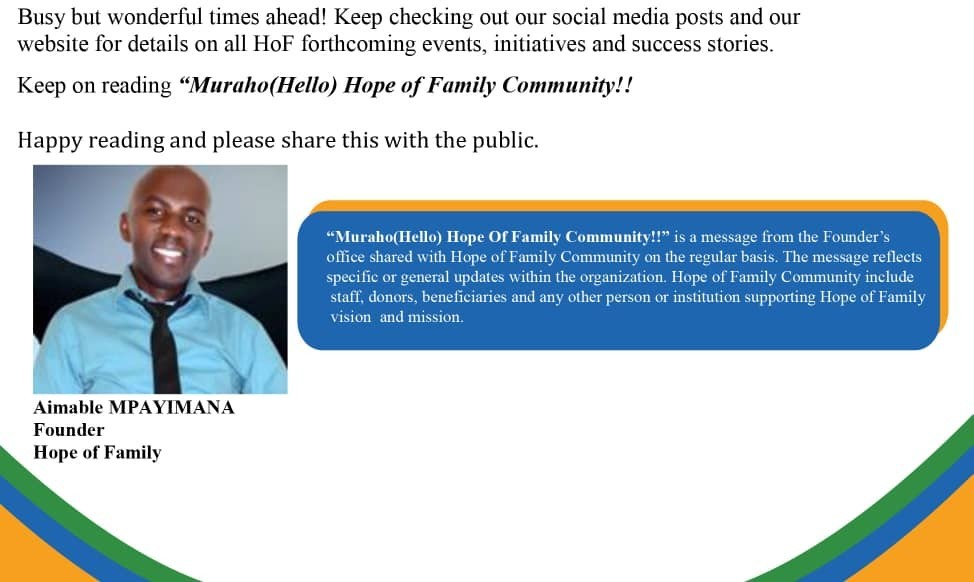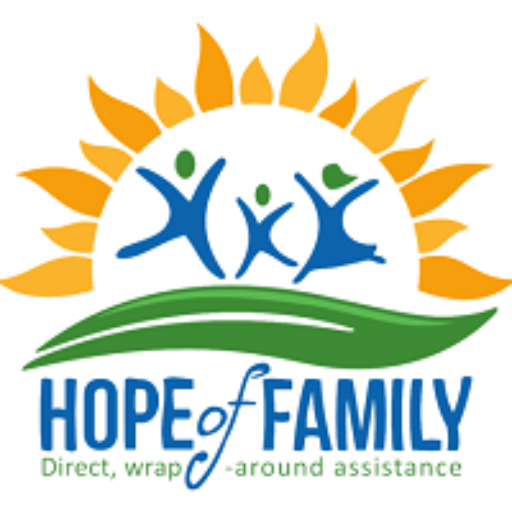Hope of Family, a local NGO working in Southern Province, Muhanga District, supports around 100 vulnerable families since 2018. Its primary goal is to promote parental involvement in children education while improving social economic status of families.
From November to December 2018, Hope of Family conducted a baseline survey among beneficiaries to evaluate the level of families’ livelihood and socioeconomic status as well as to determine parents’ involvement in children’s education.
In November 2019, this NGO conducted midline evaluation on project impact towards enhancing children educational and family livelihood.
The findings show more achievements that ensure full graduation of beneficiaries by the end of May 2020 as it was in the organization’s plans.
As far as education is concerned, before Hope of Family’s project implementation, 90% of children from vulnerable families could not access adequate school materials; 95% of them were provided with such materials and it’s resulting on school enrolment as well as improved performance.
Only 78% were enrolled at primary school in 2018. Hope of Family has contributed to increase the number to 100%, according to statistics from midline survey. The students’ school performance for academic year 2019 has been increased at 3% from 46.10% in 2018 to 49.20% in 2019.
The results from the survey also show behavior change among parents today as they are 100% involved in children education by visiting them at school and providing them with revision time at home.
According to the findings from the baseline survey, 90% of parents weren’t accustomed to give revision time of lessons to their children at home. Currently, parents fully assist their children and mobilize their neighbors to be involved in children's education, as per midline study findings.
Talent detection program is promising
There are over 100 children from families that work with Hope of Family. Their talents were not identified before. Hope of Family has started the program that aims at talents detection and development in art, football and traditional rhythm.
“Over 30 children were selected among our beneficiaries. Up to now, we have two teams; one for boys, the other for girls to be coached throughout the program. Five children in art and 40 in traditional dance have been selected”, said Emmanuel Mfateneza, the –in charge of Monitoring and Evaluation within Hope of Family.
Tracking children behavior at school
Hope of Family conducted children behavior assessment at school in November 2019 at E.P Mbare and GS St Etienne Shyogwe where 40 students supported by Hope of Family project study.
The purpose of this assessment was to monitor and evaluate the student’s children behaviors at school. Twenty teachers have participated in this assessment by answering questions related children behavior at school.
The findings show that 35 out 40 students (87.5%) respect their colleagues and teachers while 55% do homework and exercises given by teachers while 52,50% perform well in class, among other positive behavior..
As far as negative discipline is concerned 11 out of 40 students (27.5%) comes to school late. 20% have bad performance in class while 5% fight with their schoolmates and refuse to cooperate with them in everyday activities.
Promoting adult literacy and capacity building among the beneficiaries
To promote a reading culture, adult literacy and numeracy, a community library was set at Hope of Family premise. Local residents of Shyogwe Sector attend this library every Monday for reading and learning.
The adult literacy program contributed to increase the number of heads of families who know to read and write. At least 75% of parents know to read and write from 40% last year and 70% of them attend community library compared to 30% before.
Parents (20%) attended training about parental involvement in children's education and family livelihood (baseline survey). The project activities contributed to fully attendance (midline survey).
Supporting families’ initiatives for their socio-economic welfare
The baseline survey showed that only 40% households had livestock from which they could get money for basic needs and income generating projects. Today all the families have livestock through the organization’s support.
The number of households attending saving groups increased to 94% from 70% in the first year. The saving saving culture in community was then promoted.
Hope of Family educated local residents on nutrition-related behavior and set kitchen gardens in 100 homes to fill the gap in fighting malnutrition.
Households (100%) hadn’t smart and clean toilets at home (baseline), 20% of these households benefited from the activities promoting access to improved sanitation facilities and cleanliness. 20 latrines were built for 20 vulnerable families living in Shyogwe Sector while 100 families were given handwashing materials.
“Through Hope of Family’s support, we have handwashing materials; we were trained on how to use these materials. We know we have to wash our hands after using the latrine and whenever it’s necessary” a beneficiary testifies.
Mutesi Francine appreciates the latrine built to her family, saying that as it’s cleaner than the one they were using before, it will help in reducing the spread of diseases associated with poor hygiene that used to attack family members.
All households are 100% registered in community health insurance scheme of 2019/2020 from 60% last year. They participate in community saving groups from 70% last year to 94% through information they can now get from communication materials (radios and telephones) given to them.
In everyday activities, Hope of Family is assisted by local leaders who appreciate efforts made in improving the livelihood of beneficiaries mainly those living in Kabungo, Nyakabingo villages of Kinini cell, Shyogwe sector, Muhanga district in Southern Province of Rwanda.
The current stage of project implementation is promising to the extent that the total graduation of beneficiaries will be celebrated in May 2020 as it was in the Organization’s plan.



